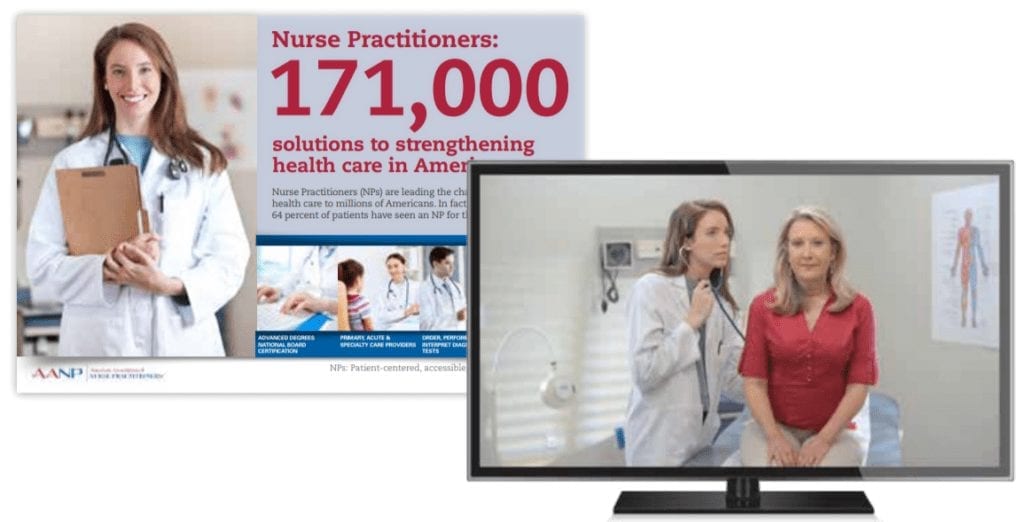American Association of Nurse Practitioners
Challenged by today’s changing health care landscape, our client – a professional trade association that recently merged with another like-minded group consisting of primary care providers – sought to brand themselves and their new leadership with the Washington, DC, policy elite.
A Research-Driven Plan
720 Strategies’ proposed a plan: A research-driven, targeted, comprehensive awareness campaign to educate Washington, DC’s health care policy elite on the important role their members play in delivering quality care.
Using our research-based methodology, we identified the proper channels to reach the target audience:
- Utilize a “surround sound” approach to educate and persuade our target audiences about the value of the association’s members and leadership.
- Leverage multiple advertising media, including television, radio, social media, live events and the web, to tell their story.
- Demonstrate the credibility, value and importance of their members using third-party messengers.
Testing America's Perceptions
We commissioned a national poll to test America’s attitudes and perceptions about the work of this association’s members. Our survey of 1,000 registered voters told us that Americans had a very high confidence level in the care these primary care providers offer.
Our poll also told us that respondents weren’t exactly sure what kind of services they are able to provide. For example, only 50% of respondents knew that they can prescribe medication. That’s an identical match to the same question asked four years ago in a previous poll.
The needle wasn’t moving.

U.S. Health Care Changed Forever
With the enactment of the Patient Protection and Affordable Care Act, health care in the United States changed forever. Primary care providers would see an increase in the number of patients due to the fact that more Americans will have health insurance. It was more important than ever to get the word out that our clients are a solution to the looming health care shortage and that they can provide patient-centered, accessible, high-quality health care.
A 120-Day Plan
- We wrote, edited and produced a national television ad that aired on cable news for six weeks. The ad ran a total of 25 times on a national cable network’s morning show. The ad featured our client’s members in a number of primary care settings showing the different clinical services they provide.
- Created, edited and produced a radio advertisement aimed at Washington, DC, insiders over the same time frame. We bought air time on the area’s two most popular talk show stations over the drive time hours. Our spot aired a total of 186 times during the most frequently listened to times of the day.
- Morphed our national television ad into a public service announcement and sent it to over 175 targeted TV stations across the country.
- Produced a print advertisement for Washington, DC, distribution. The ad was designed for DC’s influential health care policy community.
- Recruited patient advocate groups to give third-party accounts about how their vulnerable membership relies on the work of these primary care providers. The advocates were prominent participants at our in-person events.
- Conducted two Capitol Hill briefings to educate House and Senate policymakers on the role that this provider plays in our health care system. Association leadership used this as an opportunity to continue their in-depth policy discussions to a large, important audience. Throughout the course of the campaign, House and Senate health care staff and Chiefs of Staff received 34 messages from our client.
- Held a press conference at the National Press Club for the group’s leadership and third-party advocates to discuss the important role their members play in today’s health care landscape. We targeted a health care-focused national media audience and Washington, DC’s influential health care community. 331 news websites in over 14 countries carried our press release for their viewers – which garnered 5.95 million online impressions.
- Created list of Washington, DC, health care “influentials” to build a social media calendar for Twitter, Facebook and email messages. Association staff is now able to connect with a broad audience via multiple communication avenues. The detailed calendar gave them a road map to connect with three distinct groups – association membership, health care policy “influentials” and select dignitaries in Washington, DC. These health care policy decision makers received 23 communications over the course of the campaign and 34 through the course of 2014.